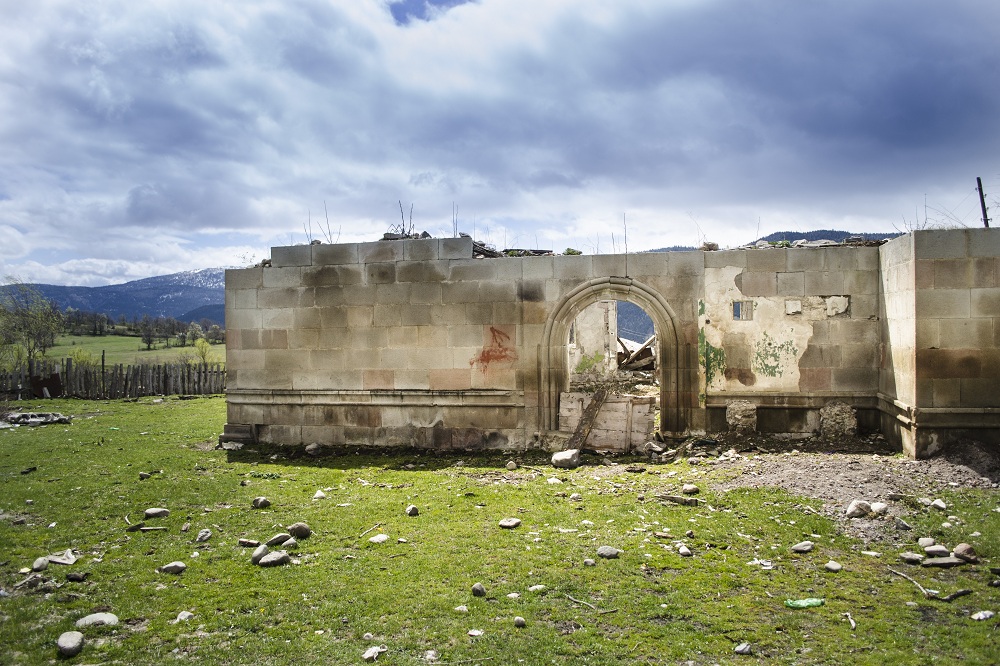საერთო ცხელი ხაზი +995 577 07 05 63

 Photo:"Liberali", Dato Pharulava
Photo:"Liberali", Dato Pharulava
The Human Rights Education and Monitoring Center (EMC) has applied to the European Court of Human Rights (ECHR) on human rights violations committed in 2014 against the Muslim community living in the village of Mokhe (Adigeni Municipality). In its application, EMC disputes the alleged use of excessive force and ill-treatment by the police against four Muslim persons participating in a peaceful assembly, specifically - violations of Article 3 (Prohibition of torture and inhuman or degrading treatment), Article 8 (Right to respect for private and family life), Article 14 (Prohibition of discrimination) and Article 13 (Right to an effective remedy) of the European Convention on Human Rights. EMC is managing the case together with is partner organization - European Human Rights Advocacy Centre (EHRAC).
On October 22, 2014, during a dismantling of a historic mosque located in the village of Mokhe, the police (mobilized around the building) arrested a group of Muslims (a total of 14 people) spontaneously gathered at the site and used disproportionate police force against some of them. The applicants of the case are four persons, against whom the police used especially brutal physical and psychological violence. Apart from beating during the arrest, these four persons were subjected to psychological and degrading treatment at the police station, with one of them being subjected to brutal physical violence. In addition, employees of the Ministry of Internal Affairs exhibited hate speech on religious grounds during all stages of conducting police measures.
The facts and claims presented by the applicants as part of the case are supported by witness testimony, including 13 neutral persons in addition to the 14 arrested individuals; medical documentation verifying physical injuries received by the applicants; expert conclusions of a physical and psychological examination conducted by the Georgian Center for Psychosocial and Medical Rehabilitation of Torture Victims (GCRT).
In the context of the essential requirement of Article 3, the applicants dispute the use of inhuman and degrading treatment against them by government representatives. The use of hate speech against Georgian Muslims by the police, which was expressed through degrading statements based on religious grounds, enhances the gravity of ill-treatment by the police and points to especial vulnerability of the applicants.
The applicants provide a detailed description of the flaws of the investigation process and its inefficiency in the procedural violations part of their application.
The investigation on the alleged abuse of authority by the police has been underway in Georgia for almost two years now; however, despite numerous requests by EMC, the applicants have still not been granted the status of a victim, which deprives them of any means to control and oversee the investigation. Proper qualification of the disputed act is also a problem, since the Prosecutor’s Office completely ignores the reasonable suspicion regarding the existence of a motive of hate in police actions. Despite the fact that witnesses have identified specific police officers that had acted in violation of the law, no suspect recognition measures have been taken against any employees of the Ministry of Internal Affairs and no criminal prosecution has been launched. On the contrary, instead of holding persons identified by witnesses responsible, an employee of the Ministry of Internal Affairs Gela Kokhodze was promoted and appointed as head of the police station that was opened in Mokhe specifically after the incident.
The existence of a hate motive in the case and the ineffectiveness of its investigation points to the violation of Article 14 of the Convention as well, or the government’s obligation to prohibit discrimination.
In its application, in addition to the violation of the rights of the Muslim community in Mokhe, EMC points to the systemic occurrence of acts of religious-based violence and intolerance against Muslim communities (Nigvziani, Tsintskaro, Samtatskaro, Chela, Mokhe, Kobuleti, Adigeni) and the Georgian Government’s ineffective and non-secular policy in this area. In this regard, EMC refers to critical assessments recently provided by international organizations (including the European Commission against Racism and Intolerance,[2] Advisory Committee on the Framework Convention for the Protection of National Minorities,[3] Council of Europe Commissioner for Human Rights [4] and the UN Human Rights Committee[5]). It should be noted that no one has been held responsible in any of the above cases of violations of the rights of the Muslim community. Conflicts like this are being conserved at the expense of the rights of Muslims.
EMC appeals to the ECHR to assess the case in its larger political context and hopes that if a violation is found the Court’s decision on the above case will serve a preventive function for the protection of the religious and other rights of non-dominant religious groups.
--------------------------------------
This statement was prepared as part of the project - Increasing Access to Justice for Discriminated Religious Communities, implemented by the Human Rights Education and Monitoring Center (EMC). The project is funded by the United States Agency for International Development (USAID) through East-West Management Institute’s (EWMI) Promoting Rule of Law in Georgia (PROLoG) Program.
--------------------
[1] Detailed information about the incident can be found here: http://emc.org.ge/2014/10/23/gancxadeba-moxes-incidenttan-dakavshirebit/
[2] The report is available at:https://www.coe.int/t/dghl/monitoring/ecri/Country-by-country/Georgia/GEO-CbC-V-2016-002-ENG.pdf
[3] The assessment is available at: https://rm.coe.int/CoERMPublicCommonSearchServices/DisplayDCTMContent?documentId=0900001680590fb5
[4] The assessment is available at: https://wcd.coe.int/com.instranet.InstraServlet?command=com.instranet.CmdBlobGet&InstranetImage=2903587&SecMode=1&DocId=2367686&Usage=2
[5] The report is available at: http://www.state.gov/j/drl/rls/irf/religiousfreedom/index.htm?year=2015&dlid=256191#wrapper
The website accessibility instruction